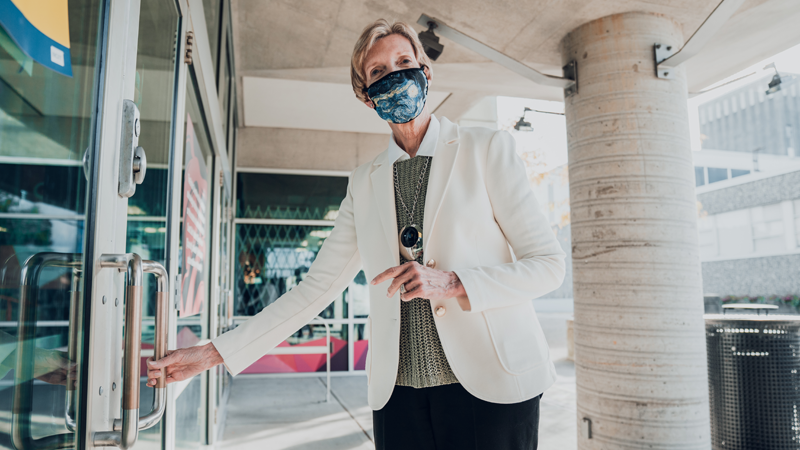Photo: Kathy Kinloch, President, BCIT showcasing the antimicrobial copper patches installed at BCIT in Fall 2021.
In 2021, Teck’s Copper & Health Program partnered with the three largest post-secondary institutions in B.C. to install antimicrobial copper surfaces on campuses ahead of students returning for the fall semester. The installations were completed to help reduce the spread of harmful bacteria on high-touch surfaces, while increasing awareness of copper’s antimicrobial properties and highlighting Teck’s involvement in creating safer public spaces.
Underscoring the concern for the health and safety of students, faculty and staff as in-person learning returned amidst the COVID-19 pandemic, the B.C. Centre for Disease Control noted in its B.C. Return-to-Campus Guidelines, “Young people have been disproportionately affected by the pandemic. Enabling them to return to closer-to-normal learning, recreational, and social activities is needed for pandemic recovery.”
Copper is a proven killer of bacteria, with both Health Canada and the US EPA affirming that 99.9% of bacteria are killed within two hours or less of contact with antimicrobial copper surfaces.
Copper on Campus
Ahead of the start of the fall semester, Teck partnered to install:
-
More than 1,000 copper patches1 at British Columbia Institute of Technology’s Burnaby campus
-
More than 1,600 copper patches at Simon Fraser University’s Burnaby and Surrey campuses and at SFU’s Vancouver and Burnaby student residence buildings
-
Copper patches installed throughout the University of British Columbia’s Faculty of Applied Science buildings
Antimicrobial copper patches were installed on high-touch surfaces including door handles and push bars. Posters, email and social media posts highlighting the use of antimicrobial copper on campus were used to complement the installation and increase awareness among students, faculty, staff and visitors.
BCIT President Kathy Kinlock commented on the installation, “As we start a new fall term, we are committed to continuing to provide a safe place to work and learn for all staff, faculty, and students. With the installation of this innovative antimicrobial copper on high-touch surfaces across our Burnaby campus, the Copper & Health program builds on a productive and exciting partnership between Teck and BCIT spanning over 35 years.”
Compelling Results
The installation of copper patches at BCIT was paired with an auditing process to measure results. The copper surfaces were swabbed to measure the amount of living microorganisms—specifically the molecule adenosine triphosphate, or ATP—compared to the other stainless-steel surfaces found on campus.
The average ATP score of the copper surfaces was 182, while the average reading for the control surfaces was 1,788. To put that in perspective, a score of 400 or under is considered acceptable, while anything above 800 indicates that action (e.g., cleaning and disinfecting) is required. These promising results show that antimicrobial copper is reducing the spread of bacteria and achieving the registered label claims.
Copper & Health’s far-reaching and impactful education-focused partnerships in 2021 have been met with an impressive response - helping to deepen community connections and engagement. Learn more about antimicrobial copper and our Copper & Health program at www.copperstopsthespread.com.


